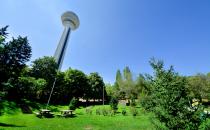Student Mobility (EU) - Incoming
If you are interested in studying and living in Turkey as an exchange student at TED University for one or two semesters, your first step should be to contact the Erasmus+ Coordinator or International Relations Officer at your home university. You can participate as an exchange student if your university has an Inter-institutional Agreement with TED University under the Erasmus+ Programme.
To study at TED University as an Erasmus+ exchange student, please follow the steps outlined below.
To study as an Erasmus+ exchange student at TEDU, your home institution must first select and nominate you. Your home institution must nominate you using this form. Once nominated, the IPO will email you all the essential information to complete your application. It is important to note that the nomination process is a crucial step and must be completed by your home institution before you can proceed with your application. Please be informed that all applications must be submitted to the Exchange Programs Division via email at erasmus@tedu.edu.tr.
As part of your exchange application, you must submit the following documents by the specified deadlines:
- Application Form
- Two biometric photos
- A copy of your passport ID page
- Latest official transcript (English)
- Online Learning Agreement
- English certification letter by your University*
- A copy of health insurance valid in Turkey
- In case of any severe disability, a medical certificate stating the level of disability.
* Please check the Language Requirements for more information.
Nomination Deadlines
- Fall: May 31st
- Spring: November 30th
Application Deadlines
- Fall: June 30th
- Spring: December 31st
It is possible that the course offerings for the upcoming semester may not be available during the application process. However, we suggest checking the list of courses offered in the previous semester as a reference. Moreover, it is recommended to visit the websites of specific programs related to your field of study to gain a better understanding of the available courses:
Exchange students are not required to register for courses on their own through the TEDU Portal. Instead, the International Programs Office will send an email to you about the course registrations before the semester begins. We will then communicate with Student Affairs on your behalf to complete your registration based on your course list.
Course registration occurs at the start of each semester, and students have a two-week "Add/Drop period" during which they can modify their course schedules. After the Add/Drop period ends, exchange students are expected to finalize their schedules and update their Online Learning Agreements, which are signed by both the home and host institution coordinators.
Exchange students accepted to TED University are considered TEDU students for the duration of their enrollment. They have the same rights and privileges as TEDU students, while also being subject to academic and administrative regulations that apply to TEDU students.
Upon completion of your exchange period, TEDU will provide your home institution with your Transcript of Records and Certificate of Attendance.
At TED University, all courses are taught in English, so students must have English language proficiency at the B2 level. To demonstrate their proficiency, students can provide:
- a B2 level IELTS, TOEFL or EU Academy OLS score,
- or a proficiency certificate signed by their Home Institution.
However, students from our partner countries where English is an official language are exempt from submitting proof of language proficiency.
As a participant in the exchange program at TEDU, you will be assigned a designated program and a Departmental Coordinator who will act as your supervisor throughout the program. The Departmental Coordinator will be responsible for providing you with guidance and support, as well as monitoring your progress. To find out who your Departmental Coordinator is, you can click here to view the list of coordinators. This information will be helpful as you prepare for your exchange program at TEDU.
It is your responsibility to be aware of and act according to the rules and regulations about visa and residence permit. Please pay attention to avoid any serious legal problems and financial penalties in the future. In case of any problem or confusion, you need to contact the Immigration Office. Please take note of the following important information regarding visa and residence permit in Turkey:
Visa
It is your responsibility to determine whether or not you need a Turkish education/study visa. If you are eligible for a touristic e-visa, you must enter Turkey with an e-visa. If you are exempt from visas to TR, you can travel with only a valid passport. However, if none of these apply to you, you must apply for a visa at a consulate. Please check this link http://www.mfa.gov.tr/visa-information-for-foreigners.en.mfa for visa information for foreign nationals. To find out whether you need to apply for a study visa, you must contact the nearest Turkish Embassy/Consulate.
Residence Permit
All foreign nationals must obtain a Residence Permit, an official document indicating registration at the Directorate General of Migration Management (Immigration Office), within one month of entering Turkey. The International Programs Office will assist you with the necessary procedures. Please note that due to the high number of first-time applications, you may not get an appointment until one month after the day of your arrival. However, you must get an appointment within 30 days of arrival. Appointments may be given for 4-6 weeks after the beginning of each semester due to the high number of applications. To apply for a Residence Permit, you need to schedule an online appointment from e-Residence website and submit the required documents to our office:
- Residence Permit Application Form
- Receipt of Residence Permit Card Fee Payment
- A copy of your passport ID page along with the TR entry stamp
- Student Certificate
- 4 biometric photos
- Valid Health Insurance
- Proof of Residence in Turkey (Notarised Rent Contract, Letter of Commitment from landlord, or Letter of Confirmation from dormitory)
Click here to access the booklets (available in English, Arabic, Russian and German) for the residence permit application.
Upon checking your documents, the IPO will submit them on your behalf. Please note that any missing document will result in a rejection of your application. Besides collecting the application documents and taking them to the Immigration Office, the university has no authority over the residence permit procedures.
As per the agreement between the Presidency of the Council of Higher Education and our Ministry, effective from 29th November 2023, all students pursuing higher education at the associate, undergraduate, graduate, and doctorate levels are required to submit the necessary documents alongside the student residence permit registration form to the relevant unit (Student Affairs Office or International Student Office) at their university. This should be done without delay, and students should not wait for an appointment date after applying for a student residence permit.
Health Insurance
All international students must have valid health insurance for the entirety of their academic stay. If your health insurance is different from the options below, you can use it for medical care in Turkey, but it won't be valid for the residence permit application. The following are the only types of health insurance that are valid to be used for the residence permit application:
- Private Health Insurance (Recommended): If you plan to bring your private health insurance from your home country, it is important to note that the coverage table must be explicitly shown in your insurance policy. Your insurance policy must comply with the minimal requirements and be valid in Turkey. Your policy must state "This policy covers the minimum coverage stipulated in circular no 9, dated 06/06/2014, on private health insurance required to be taken out for residence permit applications." Please present your insurance policy's signed and stamped original copy during application. Please note that private health insurance obtained abroad is only valid if the same is given out by the branches (agents) of those insurance companies within Turkey. If your private health insurance company doesn't have a branch in Turkey, you can obtain a private health insurance from Turkey.
- Bilateral Social Security Agreements: You can obtain an official document from your local Social Security Office stating that you are benefiting from the health services in Turkey within the scope of Bilateral Social Security Agreements. Please contact your local Social Security Office to check if there is a Bilateral Social Security Agreement between your country and Turkey. Please be informed, private health care providers might have limited or no participation with this insurance plan. In order to be covered by Turkish Public Health Insurance, you need to get an approval for your document in Ankara Social Security Office (SGK). Here you can find the list of agreements:
- Germany TA 11
- Netherlands N/TUR 111
- Belgium BT 8
- Austria A/TR 3
- France SE 208-06 A FT & SE 208-28 FT
- Romania R/TR 3
- Czech Rep CZ/TR 111
TED University offers its students two off-campus dormitory options for their accommodation needs. If you are interested in applying for a place in either of the dormitories, you will need to contact the Dormitory Management team directly via email at yurt@tedu.edu.tr or kivanc.eryurt@tedu.edu.tr. They will be able to provide you with detailed information about the facilities, room types and prices associated with each of the dormitories. Additionally, you can also visit the official website of the dormitories at https://yurtlar.tedu.edu.tr/en/general-information to get more information about the amenities and services offered. Please note that the availability of dormitory spaces may vary depending on the time of year and demand.
However, if you prefer to find private accommodation or share a house with other students, there are some important things to keep in mind:
- Firstly, you should be aware that the Provincial Directorate of Immigration Management does not accept Airbnb stays as a valid form of accommodation. Instead, you will need an official and notarized rental contract or letter of commitment from your landlord to obtain a residence permit. This means that you should make sure to find a trustworthy landlord who is willing to provide you with the necessary documentation.
- Additionally, it's important to note that you should start the process of obtaining a residence permit as early as possible, as it can take some time to complete all the necessary paperwork. By being aware of these details, you can ensure that your housing situation is secure and that you are in compliance with all relevant regulations.
To get to the city center from Ankara Esenboğa Airport, there are several options available, including bus line 442, taxi, or shuttle services. Depending on your choice of transportation, the journey usually takes around 45 minutes.
TEDU campus is situated in the heart of the city center, making it equidistant to all major areas of Ankara. The campus's location at the intersection of the transportation network also means that it is easily accessible for students.
In Ankara, Kızılay is considered the city center and is home to all rail systems with different directions of passage. EGO is the acronym for public bus transportation. You can purchase an AnkaraKart, which is a multiple-use card, at most newspaper kiosks, EGO booths, and Metro stations.
As a student, you can apply for the AnkaraKart discount by providing your student certificate and foreign ID number (Residence Permit). With the AnkaraKart, you'll have easy access to all of Ankara's public transportation services, including buses, metros, and rail systems.
Capital City of the Turkish Republic
Ankara is the capital of Turkey, located in the center of Anatolia at an altitude of 850m. The region has been a historical crossroads of migratory streams and major trade routes. Throughout history, Ankara has been an important cultural, commerce and arts center and a major stop along the Silk Road between East and West. After becoming the capital of Turkey in 1923, Ankara transformed from an ancient Anatolian town to a modern city hosting politicians, government officials, and foreign diplomats. Ankara is the second largest metropolitan city in Turkey with a population of 5.7 million. It is also Turkey's most livable city and the heart of policymaking, education, health, trade, and technology.
Arts and Culture
Ankara is a hub for various performing arts, including opera, ballet, jazz, and modern dance. It is also home to the prestigious Presidential Symphony Orchestra and many theatres that stage ambitious productions. The city has a plethora of public and private galleries, and exhibitions are held at the Atatürk Cultural Centre. Ankara has many cinemas that showcase the best Turkish and foreign films, and there are several film festivals throughout the year, notably the International Film Days in March. In April and May, the city hosts the International Arts and Music Festival, featuring performances by the finest Turkish and foreign musicians.
Social Life
Ankara has a lively social scene thanks to its young population and numerous universities. The city boasts many cafes, restaurants, and clubs, particularly on 7th Street in Bahçelievler, Tunalı Hilmi, Bestekar, Filistin, Tunus, Sakarya and Park Streets. Gaziosmanpaşa is one of the liveliest districts in Ankara, home to many premium restaurants and clubs. Its proximity to foreign embassies and international organizations makes it a vibrant, 24-hour living place.
Tunalı Hilmi and Bestekar Streets are the main attractions for the city's young population. Most university students choose this area for its wide variety of food and shopping options. Kızılay is the heart of the city with many attractions. Its central location makes it easily accessible by transportation, drawing people from all over to enjoy plenty of shops, cafes, and restaurants.
To discover more about Ankara, we invite you to check out the following:












If you have any questions or concerns, please feel free to contact the International Programs Office by sending an email to erasmus@tedu.edu.tr.
We are excited to welcome you to TED University!